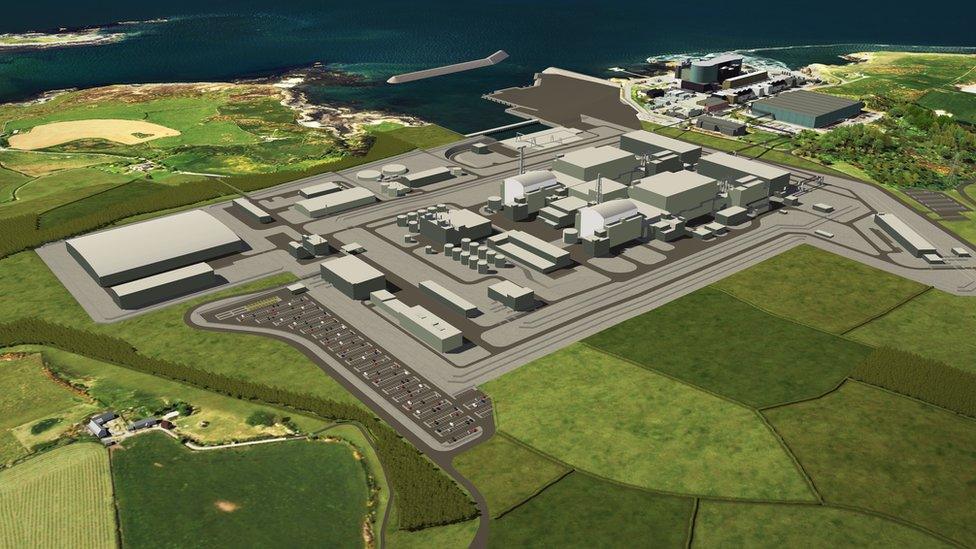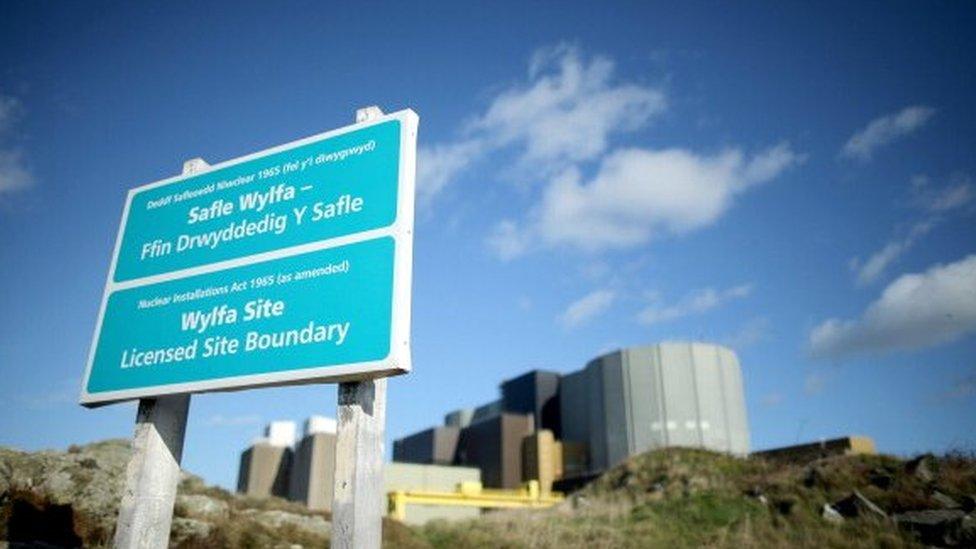Wylfa: Talks on new Anglesey nuclear plant proposals
- Published

The plug was pulled on the proposed Wylfa Newydd plant earlier this year
The UK government is having "exploratory" discussions with groups wanting to build a new nuclear plant in Anglesey, a senior official has said.
Horizon Nuclear Power withdrew plans for a new plant at Wylfa in January, blaming UK government funding options.
Japanese-backers Hitachi pulled out of the £20bn project last September.
On Thursday, official Declan Burke said the talks with consortiums proposing nuclear developments were about "better understanding the propositions".
Mr Burke, Director of Nuclear Projects and Development at the government's Business, Energy and Industrial Strategy department, was giving evidence to the Welsh Affairs Committee on Thursday.
He described the talks as "exploratory, they've brought forward potential proposals for developing the site".
Discussions concerned the "makeup of the consortia, their experience", he said.
For example, Mr Burke said, his department had been speaking to a consortium involving US engineering firm Bechtel, which proposes building a Westinghouse AP1000 reactor.
Talks have also taken place with UK-based Shearwater Energy, he said, which has hybrid plans for small nuclear reactors and a wind farm.

The previously planned Wylfa power station would have been built next to the old power plant on Anglesey
Earlier, Barbara Rusinko, from Bechtel, told the committee Anglesey "is regarded as the best site in the UK to build a large scale nuclear power station".
She called on Chancellor Rishi Sunak to commit to the project in his three-year spending review next month.
'Expectations have been raised and dashed'
Simon Forster from Shearwater said his company's use of small modular reactors (SMR) were a cheaper option than larger reactors and should be seen as a "replacement for gas" in the UK's energy mix.
He said the firm had held local discussions at councillor, MP and Senedd member level but had kept communications "very low key" because he was "acutely aware" of how "expectations have been raised and dashed" previously in the area.
"It really depends on decisions and decisions depend on price," he told MPs.
Mr Forster said "people like" Hitachi, which owns the site, the UK government and pension funds needed to "come together, take a collective decision and say 'yes, we'll got with the project and it'll look like this'".
The BBC's Roger Harrabin explains how small nuclear reactors might work - using bags of rice
Nuclear plants have years of expensive construction costs, making it difficult to attract financial backing from private investors.
They can be supported directly through public funding from taxes, by governments buying a stake in the project for example, or by giving the firm a guarantee it will be paid a certain price for the electricity generated, meaning consumers pay in their electricity bills, or a combination of both.
Mr Burke said the UK government was looking at new financial models for nuclear projects but said: "It does need to work from the taxpayer and consumer perspective as well."
Horizon Nuclear Power's plans on Anglesey had reached "the point beyond which ministers were not willing to go, despite us all very much wanting that project to work," Mr Burke added.
Ynys Môn MP Virginia Crosbie cautiously welcomed Mr Burke's comments about exploratory talks.
"I met with Bechtel this summer and I know it is very serious about developing the site, but the financial conditions need to be right," she said.
The UK government said it wanted to approve "at least one more large-scale nuclear project this Parliament in order to strengthen our energy security".